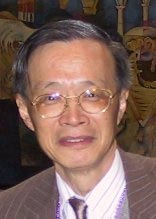NEWS
Chor Pang Lo
 William A. Owens Award 2001
William A. Owens Award 2001
Chor Pang Lo, Professor of Geography, bridges the physical, social and technical science fields to advance research on urban and suburban environments. His contributions lie in three important areas: estimation of population and population characteristics, assessment of the quality of life by integrating biophysical variables acquired from remotely sensed data with socio-economic data obtained from the census, and urban land use/cover change detection and its environmental impact.
Dr. Lo is widely regarded as one of the top scholars in urban remote sensing and in the use of GIS approaches for examining population-environment interactions.
Remote sensing is the art and science of extracting information about an object without actually touching it and is widely used in mapping terrains and human activities on the earth’s surface. Remote sensing is achieved by placing a sensor on an aerial or satellite platform from which reflectance and emittance from objects on the earth’s surface will be detected. The results are analog or digital data, from which photography and images can be created to show the characteristics of the objects.
Linking remote sensing and social science is a challenging task. Dr. Lo’s research on the application of remote sensing to study the urban environment has been recognized as a major milestone in this field. His research has been integral to a large interdisciplinary research project funded by NASA that has investigated how land cover and land use changes in the Atlanta metropolitan area over the last 25 years have impacted meteorology and air quality over the city. His work on Project ATLANTA was key to developing a better understanding of how urban sprawl has contributed to the growth of the Urban Heat Island effect. He has unequivocally illustrated how remote sensing data, in conjunction with population information, can be used to derive better quantitative information on human-induced and cover changes and to assess their effects on the environment.
Dr. Lo’s remote sensing, GIS, and associated methodological research has been published in such highly regarded journals as Photogrammetric Engineering and Remote Sensing, Remote Sensing of Environment,GeoCarto International, Computers and Geoscience, and the International Journal of Remote Sensing. His work in human-environment interactions and Chinese regional studies has appeared in such outlets as theAnnals of the Association of American Geographers, The Professional Geographer, and Urban Geography.




 William A. Owens Award 2001
William A. Owens Award 2001